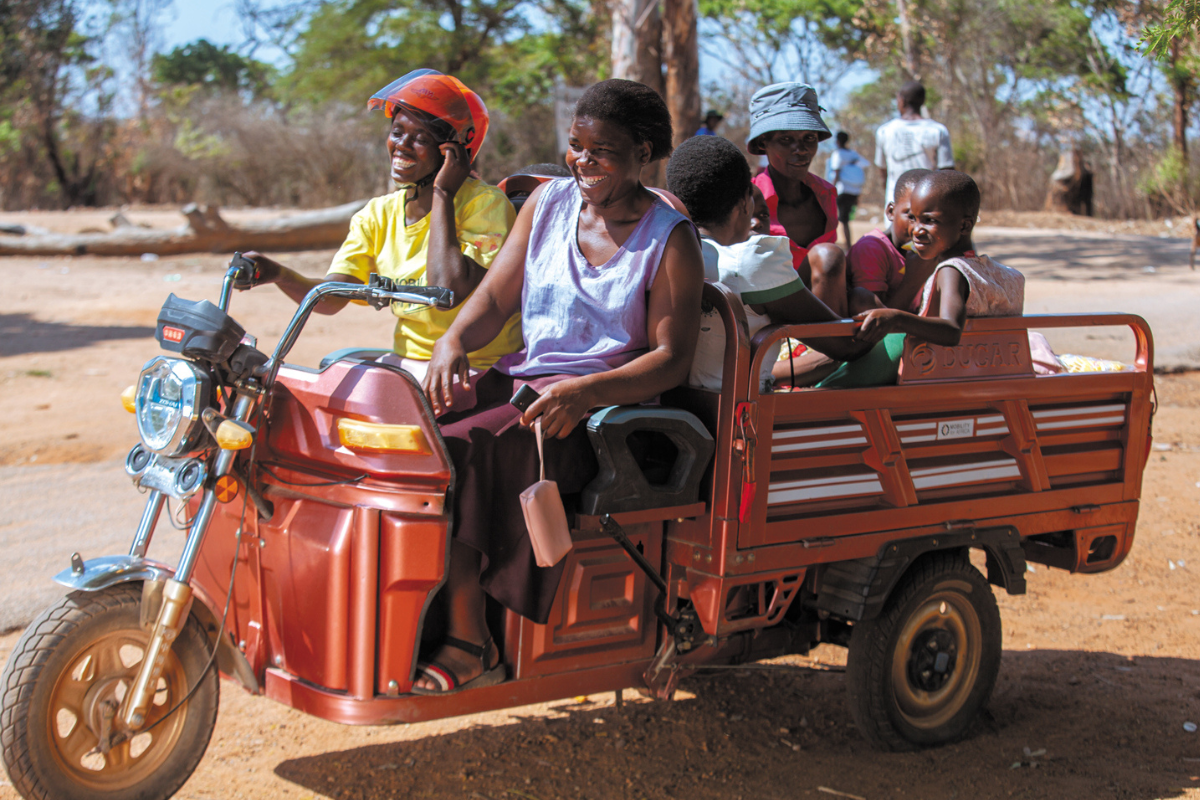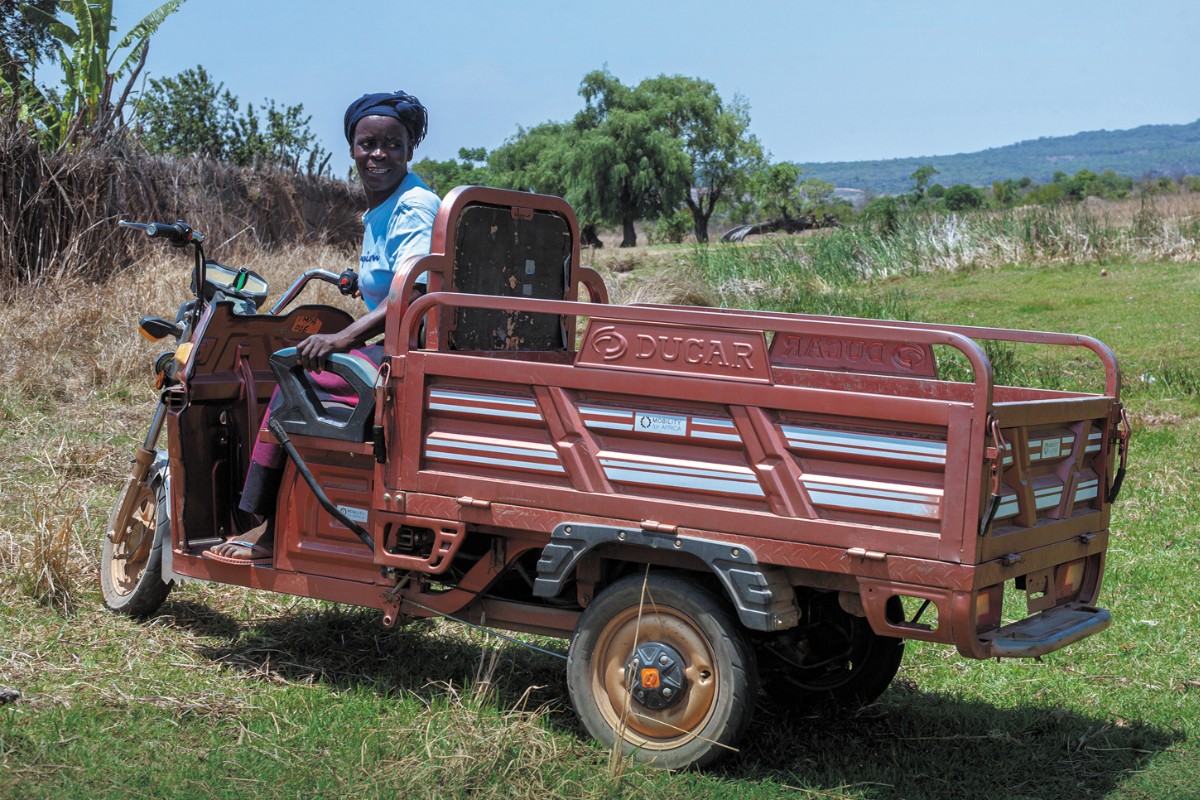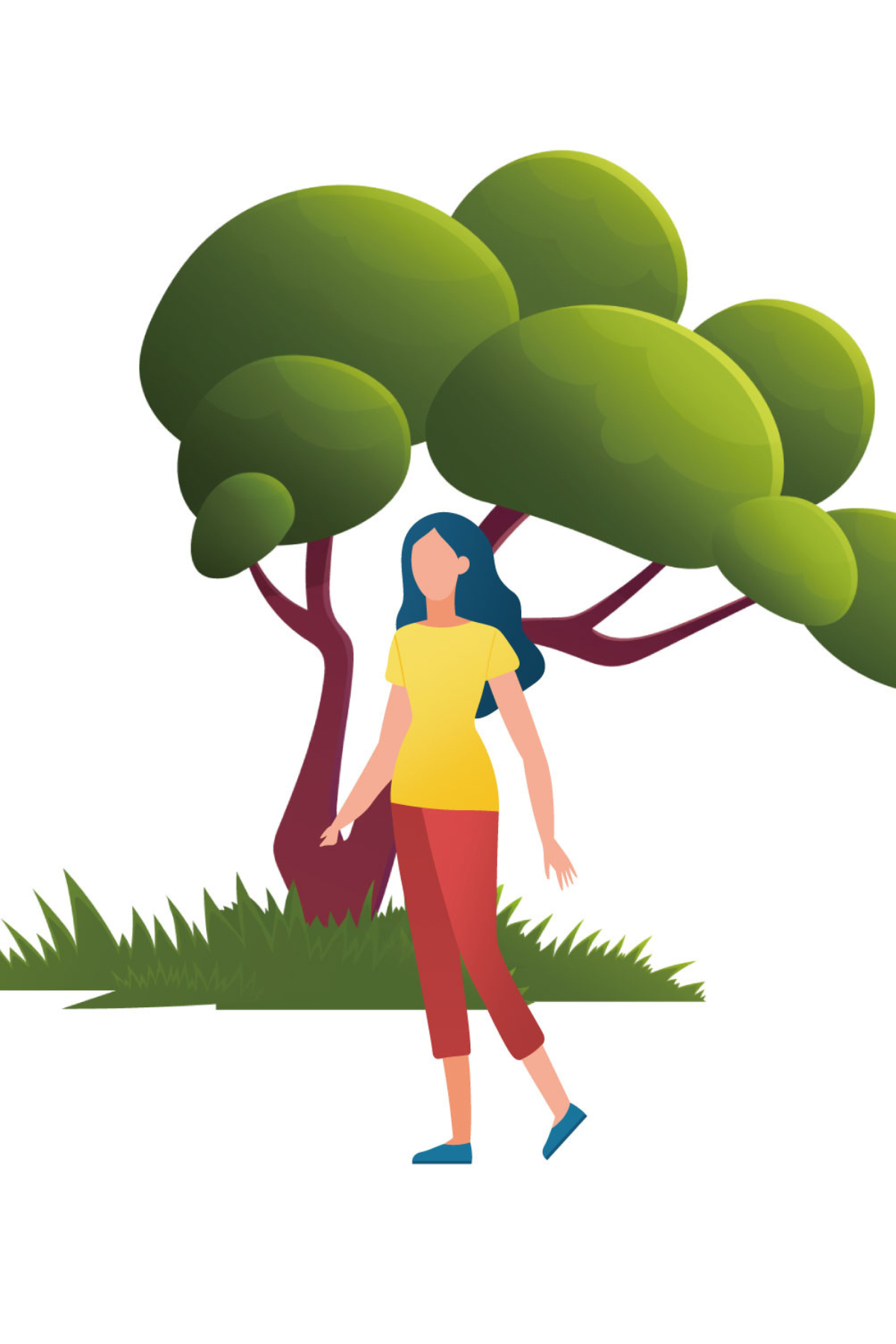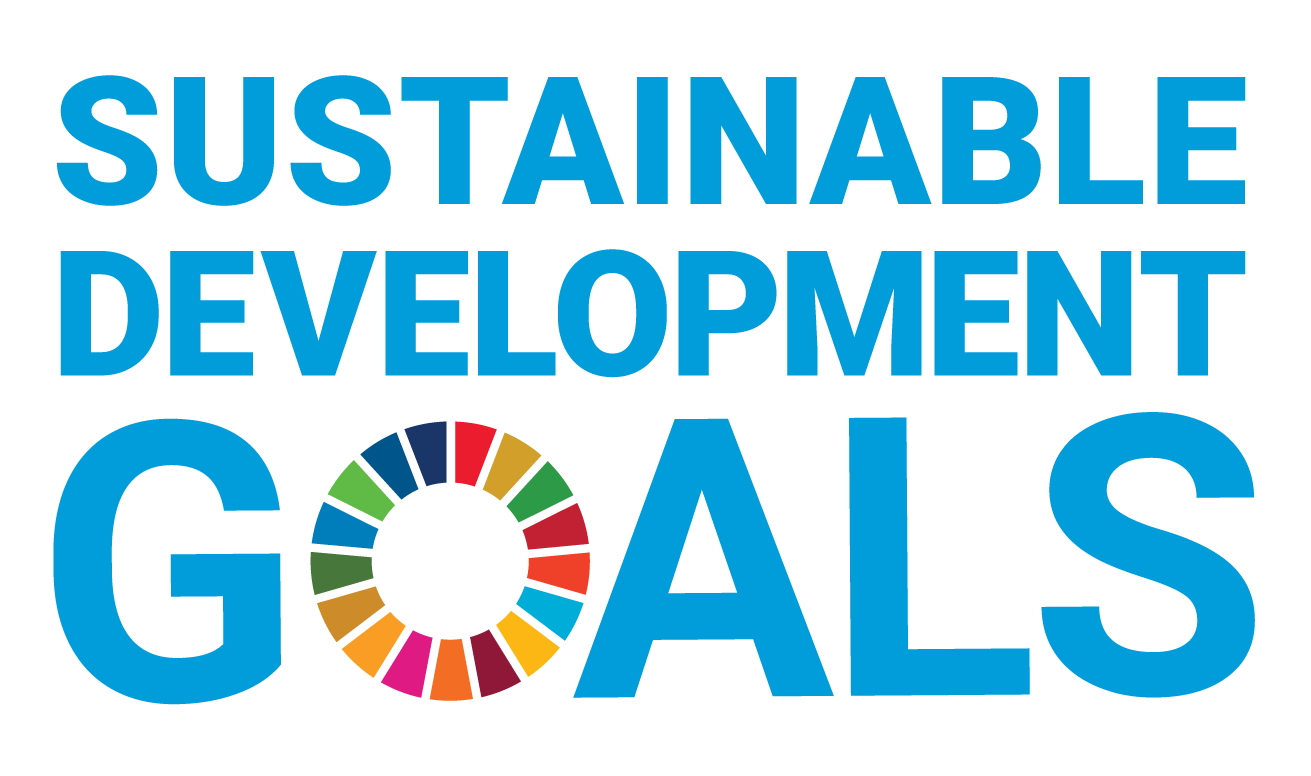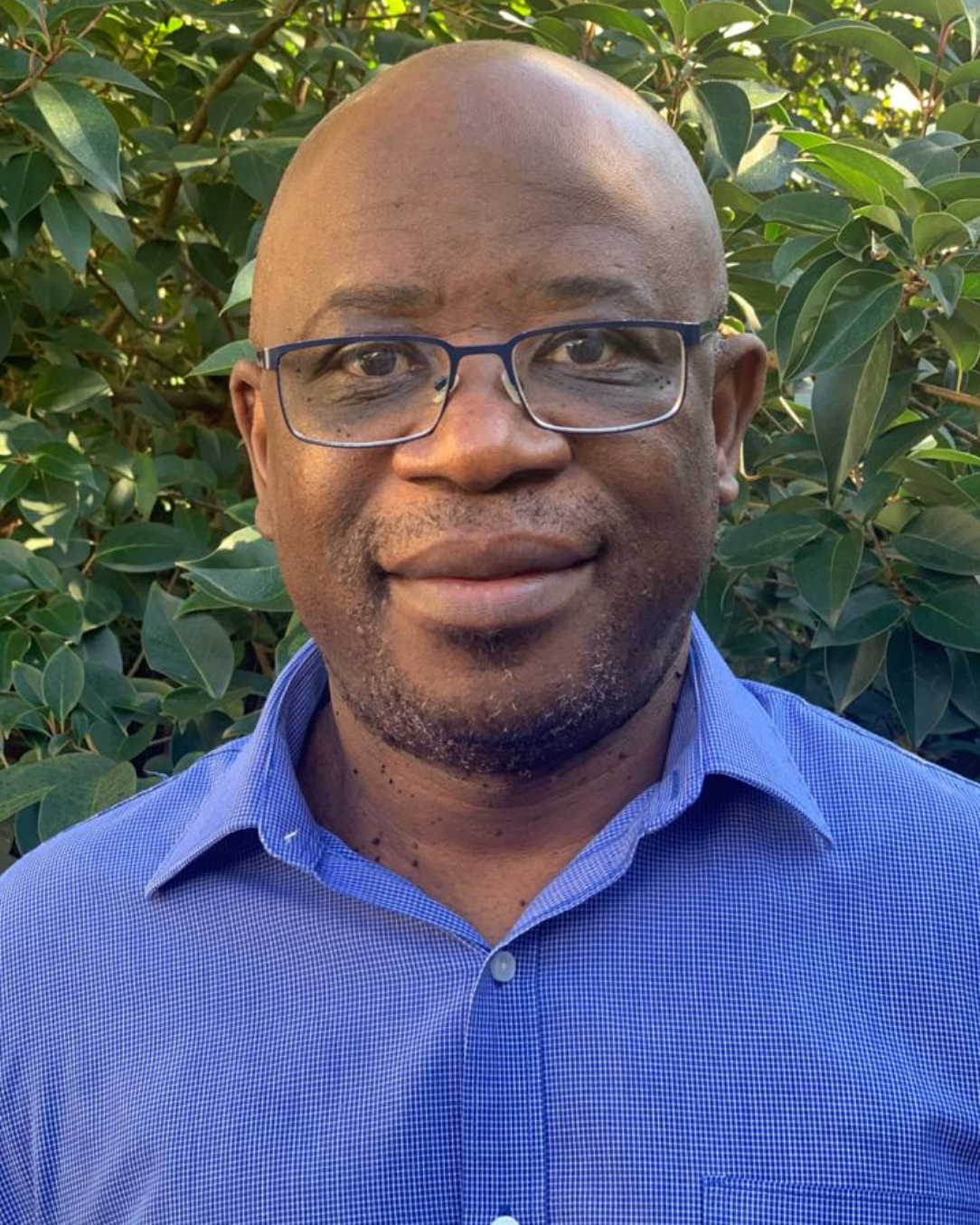You can search for courses, events, people, and anything else.
The introduction of 'hambas' — solar-powered electric cargo tricycles — to a rural district of Zimbabwe has enhanced the lives of women and their families, bringing benefits for health, agricultural production and new opportunities for income generation.
For Edina Shayanewako, a nurse at the Igava Clinic in the Wedza district of the province of Mashonaland East, the introduction of the hamba (meaning 'to move' in Swahili), is improving her ability to implement the district’s polio vaccination programme.
"It’s not easy for us nurses to reach all of the children; many people are employed on farms and struggle to get time off to take their children for immunisations. Before hamba we were missing a lot of children," explains Shayanewako. "But, with the hamba it was easy because we could go to the farms. Thanks to the hamba, nurses vaccinated 1,023 children over four days."
As with many other rural areas of Africa, subsistence farming is the main source of income in Wedza and it falls to women to carry out most of the day-to-day tasks.
But the lack of affordable transport is a significant issue. Prohibitive distances to health facilities contribute to mother and child mortality, long walks to school force children to drop out, crops rot before they get to market, and women spend hours collecting water and fuel for cooking.
"The lack of transportation can mean the difference between death and survival, because of the long distances between health clinics," says Western Sydney University’s Dr Tendai Chikweche.
CO-CREATING SOLUTIONS
The hamba project started as a broad general conversation among people with an interest in female empowerment, led by Shantha Bloemen, about the challenge of transportation for women in Africa.
Chikweche is an ethnographer whose research focuses on people living in extreme poverty, and he is also the School of Business' Academic Lead for Africa and contributes to the University’s working group on Africa strategy, while Bloemen is an entrepreneur with more than 20 years’ experience in international development in Asia and Africa, who has seen first-hand the challenges caused by women’s lack of mobility. They decided to see if they could do something about the problem themselves.
After selecting Wedza as a test case the Mobility for Africa team, including research assistants from local universities, embedded themselves with the local community, where they conducted interviews and focus groups. Over a period of two years, they stayed for weeks at a time, working with the local women to create and co-design the project.
"Living in the community and seeing the challenges the women face to go to a clinic or their fields helped us understand their experience," says Chikweche.
The women saw an opportunity for a community outcome by providing vehicles to agencies such as health workers, maternity nurses, police and agricultural support workers.
"They demonstrated that as rural African women there is a collective vision of their livelihoods. They don’t think about themselves as individuals, they are always asking: how can this help the broader community?", Chikweche recalls.
As well as being large enough to transport people and crops, the vehicle had to fit the social expectations and norms for women, for whom riding a bicycle was not socially acceptable.
Need to know
- Western’s Tendai Chikweche partnered with Mobility for Africa to address the issue of transport in Zimbabwe.
- This developed into a social enterprise that leases solar powered 'hambas' to women in rural areas.
- The programme has had a significant impact on the drivers' lives.
"The lack of transportation can mean the difference between life and death."
MOBILITY FOR AFRICA
The result was the hamba, a cargo tricycle, manufactured in Zimbabwe’s capital Harare from parts made in China, including a solar-charged lithium-ion battery. The project became a social enterprise start-up, Mobility for Africa (MFA), with Bloemen as its founder and director, and with the goal of creating a renewable, community-based transport solution for Africa.
MFA introduced the hambas to three pilot sites in Wedza. The vehicles’ rechargeable batteries are powered at community-based, off-grid solar charging ports, and MFA provides driving lessons, backup services and vehicle maintenance.
The women lease the hambas — which can travel up to 100 km per charge — on either a short-term monthly basis or over a longer term. Toyota Mobility Foundation has been a major partner of MFA from the start, providing technical support to improve performance of the hambas’ batteries and GPS.
In December 2022, Mobility for Africa was funded with US$2 million from a private investor, InfraCo Africa (part of the Private Infrastructure Development Group) to scale-up the programme. Industry players are also partnering with the hamba drivers, for example, the country’s biggest milk processor is subcontracting some of the women to deliver milk in their local areas.
The number of hambas has increased from the initial 48 to more than 600 since the launch of the programme in 2020-21.
Chikweche says the next steps are to improve the efficiencies of the lithium battery technology, while also looking for opportunities to extend the hamba for other uses, and to track and monitor the project’s commercial impact. Mobility for Africa has also started feasibility studies for a new programme in Tanzania. The big aspiration is to see hambas being introduced into rural areas in other African countries.
Another initiative he would like to see is entrepreneurship training for the women. "It has been my long-term desire to see Western Sydney University giving training to these women as part of our strategy for Africa," says Chikweche.
The development of the hamba has achieved more than just giving people access to transportation; it is having an impact across many aspects of their lives. Women are now able to take their children to school, visit clinics and maternity nurses, and earn a living from their agricultural produce.
"The change in women’s livelihoods and them being able to take control of their lives, for me is the biggest change — the fact that we have given people hope where there was no hope."
ADDRESSING SUSTAINABLE DEVELOPMENT GOALS
The hambas have helped to address problems targeted by many of the UN Sustainable Development Goals, including poverty, hunger, gender equality, clean energy, and partnerships. Freed up from time-consuming tasks such as collecting water and fuel, the women now have more time to spend generating an income.
Communities have access to shared solar energy portals in three rural sites of 3,600 people and more than 2,900 batteries have been recharged using solar energy.
More than 24 communities have been empowered by the programme, both economically and socially. Many people have been employed to assemble and service the hambas. Some of the women have become entrepreneurs, starting their own ride-share services, or setting up small enterprises to sell their produce.
The partnerships with local government have also resulted in eight vehicles for police, health workers and agricultural support staff. This aspect of the programme was vital during the height of the COVID-19 pandemic when health staff used the hambas to travel around sharing information, and later police used them to help enforce COVID-19 restrictions.
THE VIEW FROM THE ROAD
Some of the women from the Wedza pilot sites share their experiences of life since the hamba.
"For us to get home, before we had to hire a car; now because of Mobility for Africa, things are better. When two members of my group go to buy chicken feed, one will be waiting with the hamba and then we go home." — Marry Taengwah.
"We never thought that women could drive, now women in this area are driving so much that our work becomes much easier." — Caroline Mafere.
"Most of them know by now that they wait under this tree — that is where the hamba taxi will be. Sometimes there are so many people waiting, so I will go past them with my passengers. Besides offering a taxi service, when I am home, I use the hamba to carry seeds and fertiliser to my field. After I finish my field work, I will carry firewood home." — Josephine Nyevhe, taxi driver.
Meet the Academic | Dr Tendai Chikweche
Tendai Chikweche (TC) is an experienced academic and researcher with more than 20 years' experience in various disciplines primarily in marketing, marginalised consumers’ livelihoods, entrepreneurship, and innovation. Tendai’s core research interests are in the areas of design thinking, marketing to the base of pyramid, social entrepreneurship, and small business enterprises and he has been a pioneer researcher in marketing to the middle class in Africa, a region whose development he is passionate about. His current passion is research on marginalised communities focusing on how renewable energy transport solutions can be used to improve the livelihoods of women in Africa. Tendai is a Fellow of the Chartered Institute of Marketing, Australian Marketing Institute and Senior Fellow with Advance HE.
Credit
Future-Makers is published for Western Sydney University by Nature Research Custom Media, part of Springer Nature.

